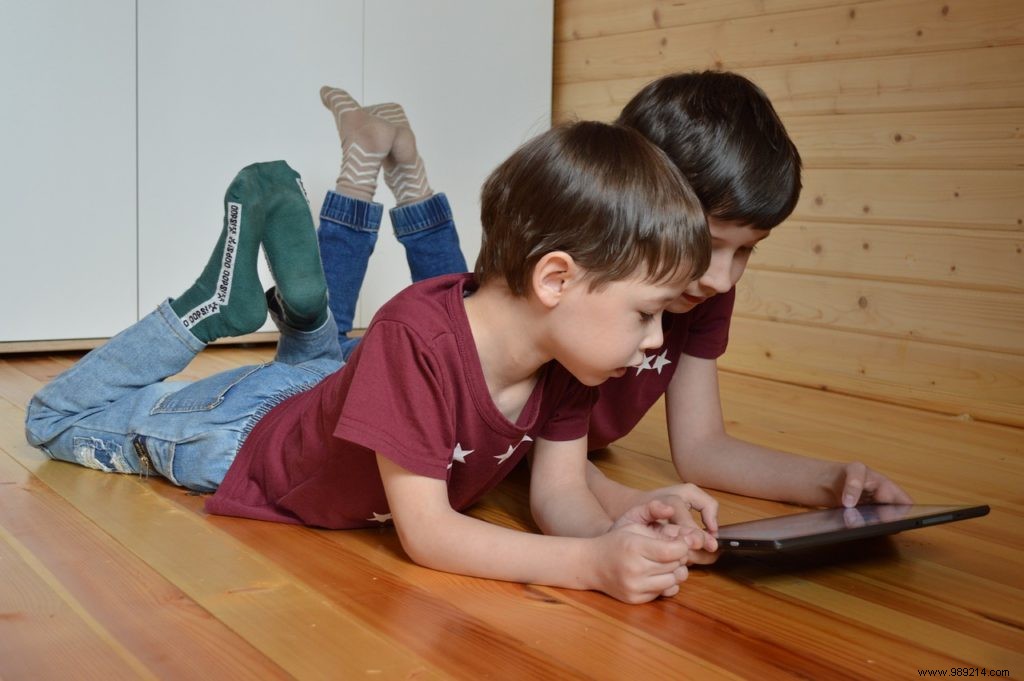
The Covid-19 pandemic has changed our lifestyles. Parties and weddings postponed, studies interrupted, certain sectors of work completely turned upside down… the list goes on! But one of the strongest impacts has been felt within families, whose daily lives are becoming more and more digital.
Contents 1 Pre-pandemic, 80% of children were already interested in screens! 2 What are the dangers for children? The digital overdose 3 How to manage the time that toddlers spend on the Internet? 4 Screens:not necessarily harmfulWith parents and children stuck at home, screens take up more space for everyone. While adults are teleworking, the little ones often take their lessons remotely. But the lockdown only reinforced trends that were already there. Long before the pandemic, 52% of parents claimed to be addicted to their smartphones, and 89% of children under the age of 8 were already using a touchscreen.
What are the risks of digital use by children? How to handle the situation during a pandemic? A brief overview in this article.

From the age of 3, the majority of children are regularly exposed to interactive screens. They generally prefer classic tablets, while a third of them play on the smartphone. Even more than their parents before them, they grow up in a digital universe whose codes they quickly learn to master.
Of course, brands do not hesitate to exploit this lucrative vein. More and more applications and various tools are marketed exclusively for young people. Messenger Kids, for example, is an application developed by Facebook and modeled on Facebook Messenger. Its target:children from 6 to 12 years old. Facebook has of course promised that there will be no advertising on this new service, but we can still ask ourselves questions about the ethics of the thing...
Parents are no better off. In 2012, a British study indicated that 66% of smartphone users felt "suffering if they had to do without it. The English even invented a concept for this digital addiction:nomophobia ("no mobil phobia "). A more insidious addiction than tobacco or alcohol, since it is centered on an object that is an integral part of our daily lives.
In adults, screen time can negatively impact memory and ability to concentrate. No wonder:when we forget something, it's easier to grab the phone than to try to remember it. And having the Internet at your fingertips also means having an inexhaustible source of distractions. Not to mention the deleterious effects of multitasking :The truth is that the brain is not designed to do several things at the same time!
In children, these potential risks may be doubled. Their brains are still in a state of construction and they do not have the same abilities of self-discipline as adults. (And adults already have a hard time resisting their smartphones…) Games on apps can quickly become addictive. This could hinder the proper development of their language skills.
Another possible danger is that children simply lose interest in the world around them. Many of them (28%) already prefer to play with smartphone applications rather than traditional toys. Exploration and creativity are a crucial part of toddler development. Games, reading, meetings, outings in nature... all this develops their cognitive, empathetic and social abilities.
One hour playing Candy Crush is a lot of fun, but it doesn't bring exactly the same benefits!
Parents are generally aware of the potential impact of new technologies on their little ones. Thus, 97% claim to have put rules in place to regulate their use. Popular methods:actively encouraging children to have fun without screens, avoiding using the smartphone in front of them, and setting hours of use. Nearly 30% of parents choose to talk openly about the risks of the Internet with their children.
Techniques that go in the direction of specialists. Elsa Job-Pigeard, co-founder of the "joue pense parle" association, advises avoiding screens before the age of 3:"Young children need all their time and all their attention. to discover the world with his 5 senses and an available adult at his side. (…) Between 3 and 10 years old, screen time should not exceed 10 to 20% of the child’s free time. »
Serge Tisseron, renowned psychiatrist and psychoanalyst, advocates the "3-6-9-12" rule:no television before age 3, no game console before age 6, no Internet before age 9, and no of social networks before the age of 12. Above all, parents must lead by example and not remain glued to their smartphone:after all, children learn by imitation!
However, the picture should also be nuanced. As often, the problem is not so much the tool itself as the use made of it. During the lockdown, children aged 6 to 12 spent an average of 7 hours a day behind screens:but this was mainly for educational purposes, to attend their lessons remotely.
In addition, families also use digital technology to get closer. Catherine Dessinges, lecturer at Lyon 3 University, reveals that "screens have been used a lot for qualitative and social purposes. They were a communication interface . For example, to chat with more distant family members.